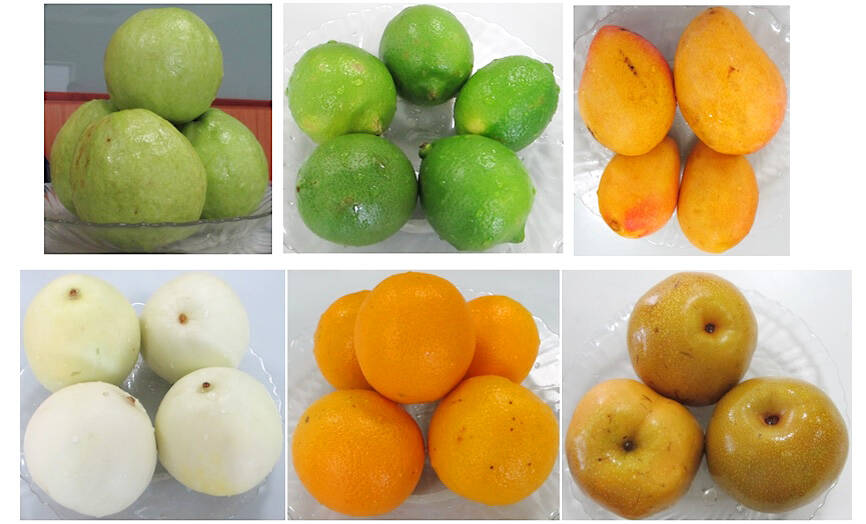An expert urged people to wash fruit thoroughly before consuming it, after a recent study by the National Health Research Institutes (NHRI) found species of yeast that were resistant to the fungicide fluconazole.
The NHRI said it researched 123 yeast isolates from 17 samples of six different kinds of fruit bought from a supermarket, and among them Candida tropicalis was the most frequently found species of yeast, including three variants that were resistant to fluconazole.
The three fluconazole-resistant C tropicalis variants belonged to the same predominant genotype of azole-resistant C tropicalis that causes candidemia, a common fungal bloodstream infection in hospitalized patients in Taiwan.

Photo courtesy of the institutes
The study suggests that the drug-resistant C tropicalis might already widely exist across the nation and can spread among the surface of fruits sold in supermarkets.
For long-term tracking of pathogenic yeast infections and the distribution and drug susceptibilities of Candida species, the NHRI’s National Institute of Infectious Diseases and Vaccinology deputy director Lo Hsiu-jung (羅秀容) in 1999 launched the Taiwan Surveillance of Antimicrobial Resistance of Yeasts (TSARY) program.
The study found that C tropicalis is one of the most common non-albicans Candida species, and it has a higher chance of being drug-resistant than other Candida species. In 2017, Lo published a study warning that C tropicalis could be found on fruit surfaces.
Since 1999, Lo’s research team has continued its surveillance of pathogenic yeast on fruit surfaces, and recently collected 17 samples of six types of fruit — pear, mango, lemon, melon, orange and guava — from a supermarket in northern Taiwan for testing, and a total of 123 yeast isolates were identified.
C tropicalis was found in 10 samples, accounting for about 60 percent, and three among them were resistant to fluconazole.
Lo said there are two possible main reasons that C tropicalis was found on fruit surfaces: the human factor, such as contamination from the hands of farmers, packaging workers, supermarket workers or customers after the fruit has been harvested; and environmental factors, such as contamination through water, soil or leaves during the growing stage.
She said the three fluconazole-resistant C tropicalis strains belong to the same predominant genotype of azole-resistant C tropicalis that causes candidemia in patients in Taiwan.
Drug-resistant C tropicalis in hospitals can be spread among patients, their family or medical personnel, and as there is no direct evidence of patient-to-patient transmission, fruit might be a transmission route of drug-resistant C tropicalis, Lo said.
Azoles are commonly used in agriculture as fungicides and also clinically as antifungal drugs to treat pathogenic fungi, she said, adding that the use of azole fungicides on fruit might have indirectly filtered azole-resistant pathogenic microbes, such as the C tropicalis, and it might spread from fruit to humans, so if the fungicide is used on vegetables or other crops, the same problem might occur.
Lo said people with healthy immune systems might not get sick from eating food with drug-resistant C tropicalis, but it might cause severe infection in immunocompromised individuals, so fruit should be washed thoroughly with clean water before being eaten to remove potential drug-resistant pathogenic microbes.

An essay competition jointly organized by a local writing society and a publisher affiliated with the Chinese Communist Party (CCP) might have contravened the Act Governing Relations Between the People of the Taiwan Area and the Mainland Area (臺灣地區與大陸地區人民關係條例), the Mainland Affairs Council (MAC) said on Thursday. “In this case, the partner organization is clearly an agency under the CCP’s Fujian Provincial Committee,” MAC Deputy Minister and spokesperson Liang Wen-chieh (梁文傑) said at a news briefing in Taipei. “It also involves bringing Taiwanese students to China with all-expenses-paid arrangements to attend award ceremonies and camps,” Liang said. Those two “characteristics” are typically sufficient

A magnitude 5.9 earthquake that struck about 33km off the coast of Hualien City was the "main shock" in a series of quakes in the area, with aftershocks expected over the next three days, the Central Weather Administration (CWA) said yesterday. Prior to the magnitude 5.9 quake shaking most of Taiwan at 6:53pm yesterday, six other earthquakes stronger than a magnitude of 4, starting with a magnitude 5.5 quake at 6:09pm, occurred in the area. CWA Seismological Center Director Wu Chien-fu (吳健富) confirmed that the quakes were all part of the same series and that the magnitude 5.5 temblor was

The brilliant blue waters, thick foliage and bucolic atmosphere on this seemingly idyllic archipelago deep in the Pacific Ocean belie the key role it now plays in a titanic geopolitical struggle. Palau is again on the front line as China, and the US and its allies prepare their forces in an intensifying contest for control over the Asia-Pacific region. The democratic nation of just 17,000 people hosts US-controlled airstrips and soon-to-be-completed radar installations that the US military describes as “critical” to monitoring vast swathes of water and airspace. It is also a key piece of the second island chain, a string of

The Central Weather Administration has issued a heat alert for southeastern Taiwan, warning of temperatures as high as 36°C today, while alerting some coastal areas of strong winds later in the day. Kaohsiung’s Neimen District (內門) and Pingtung County’s Neipu Township (內埔) are under an orange heat alert, which warns of temperatures as high as 36°C for three consecutive days, the CWA said, citing southwest winds. The heat would also extend to Tainan’s Nansi (楠西) and Yujing (玉井) districts, as well as Pingtung’s Gaoshu (高樹), Yanpu (鹽埔) and Majia (瑪家) townships, it said, forecasting highs of up to 36°C in those areas